Psychology Assignment: Lifespan Development Theories and HSC
VerifiedAdded on 2019/12/03
|12
|3198
|163
Report
AI Summary
This report delves into the realm of psychology, focusing on lifespan development and its associated theories within the context of health and social care. It begins by comparing various psychological perspectives, including continuity versus discontinuity and stage versus open-ended theories, illustrating their relevance to different life stages. The report then explores the application of these theories, such as Erikson's stages of psychosocial development and Piaget's theory of cognitive development, to the health and social care settings. Furthermore, it examines the social and biological factors that shape human behavior, highlighting their impact on mental, physical, and emotional activities throughout the life cycle. The report concludes by emphasizing the significance of social roles in health and social care settings, providing a comprehensive analysis of psychological principles and their practical implications.
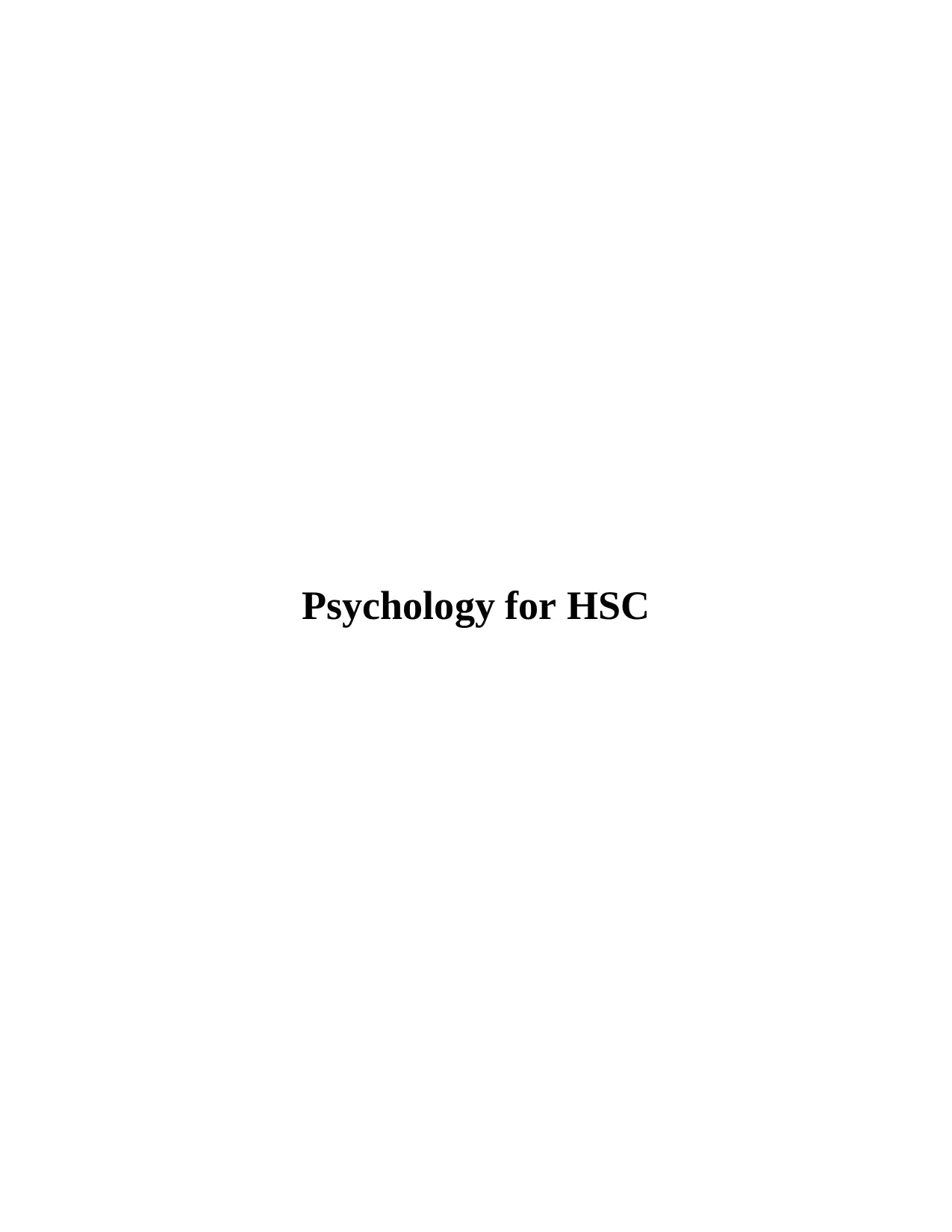
Psychology for HSC
Paraphrase This Document
Need a fresh take? Get an instant paraphrase of this document with our AI Paraphraser
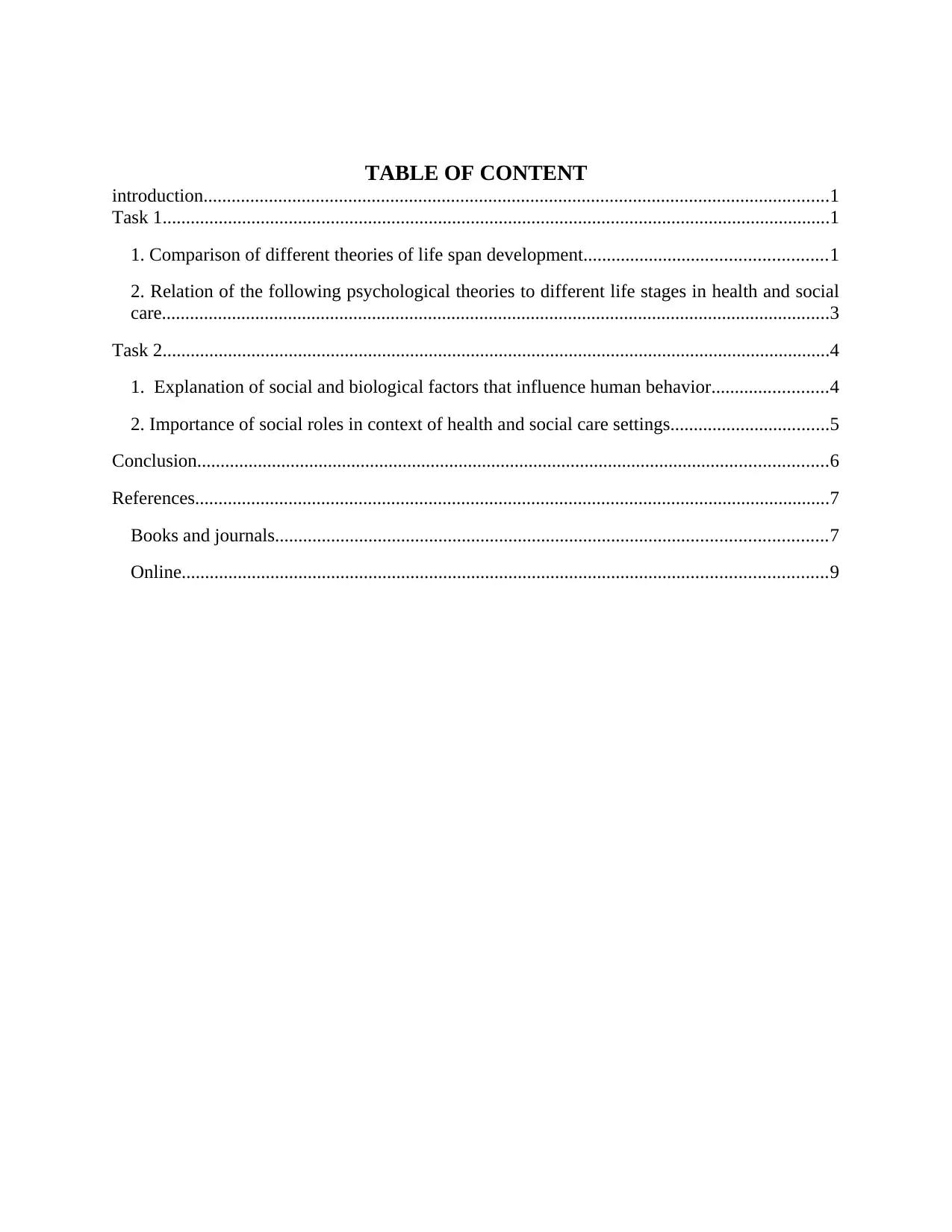
TABLE OF CONTENT
introduction......................................................................................................................................1
Task 1...............................................................................................................................................1
1. Comparison of different theories of life span development....................................................1
2. Relation of the following psychological theories to different life stages in health and social
care...............................................................................................................................................3
Task 2...............................................................................................................................................4
1. Explanation of social and biological factors that influence human behavior.........................4
2. Importance of social roles in context of health and social care settings..................................5
Conclusion.......................................................................................................................................6
References........................................................................................................................................7
Books and journals......................................................................................................................7
Online..........................................................................................................................................9
introduction......................................................................................................................................1
Task 1...............................................................................................................................................1
1. Comparison of different theories of life span development....................................................1
2. Relation of the following psychological theories to different life stages in health and social
care...............................................................................................................................................3
Task 2...............................................................................................................................................4
1. Explanation of social and biological factors that influence human behavior.........................4
2. Importance of social roles in context of health and social care settings..................................5
Conclusion.......................................................................................................................................6
References........................................................................................................................................7
Books and journals......................................................................................................................7
Online..........................................................................................................................................9
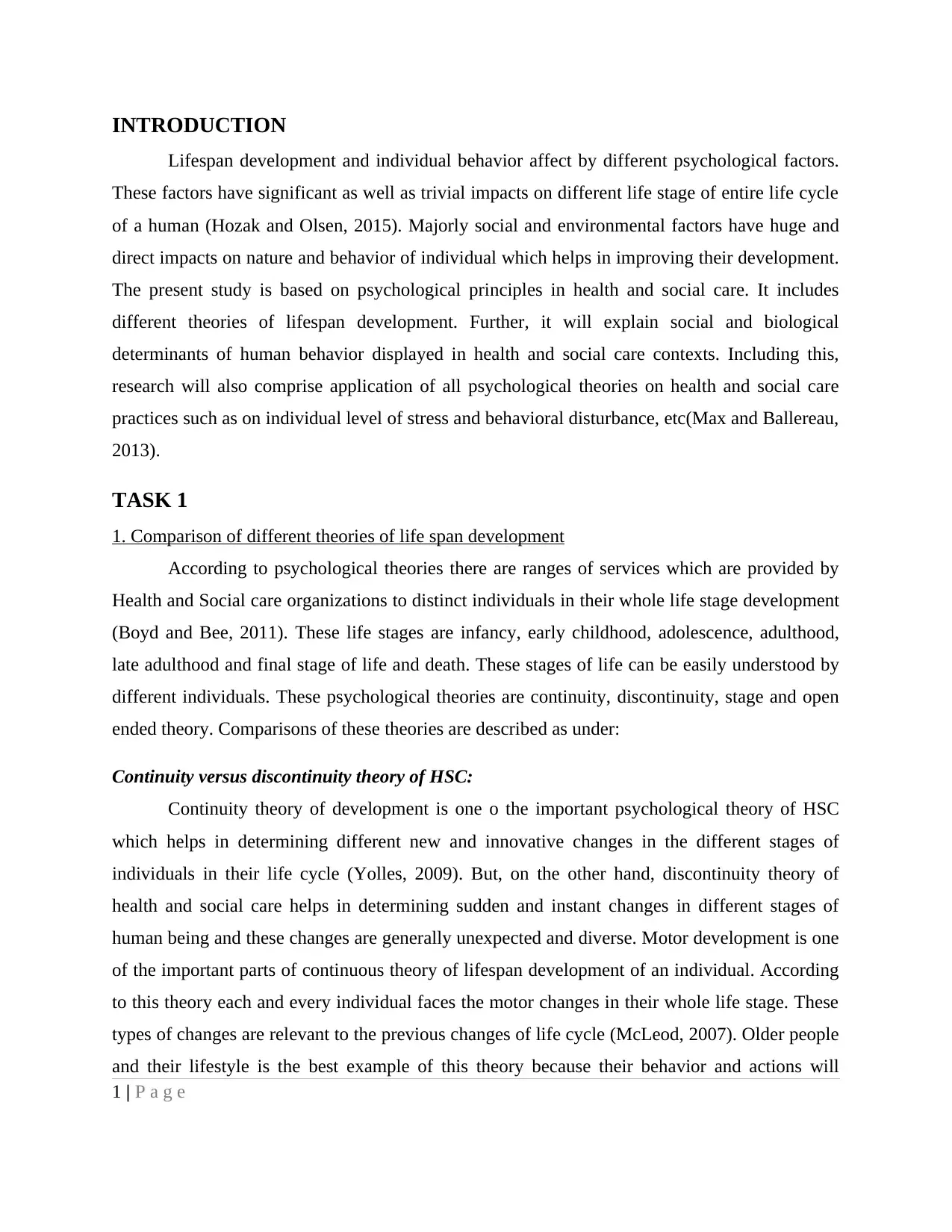
INTRODUCTION
Lifespan development and individual behavior affect by different psychological factors.
These factors have significant as well as trivial impacts on different life stage of entire life cycle
of a human (Hozak and Olsen, 2015). Majorly social and environmental factors have huge and
direct impacts on nature and behavior of individual which helps in improving their development.
The present study is based on psychological principles in health and social care. It includes
different theories of lifespan development. Further, it will explain social and biological
determinants of human behavior displayed in health and social care contexts. Including this,
research will also comprise application of all psychological theories on health and social care
practices such as on individual level of stress and behavioral disturbance, etc(Max and Ballereau,
2013).
TASK 1
1. Comparison of different theories of life span development
According to psychological theories there are ranges of services which are provided by
Health and Social care organizations to distinct individuals in their whole life stage development
(Boyd and Bee, 2011). These life stages are infancy, early childhood, adolescence, adulthood,
late adulthood and final stage of life and death. These stages of life can be easily understood by
different individuals. These psychological theories are continuity, discontinuity, stage and open
ended theory. Comparisons of these theories are described as under:
Continuity versus discontinuity theory of HSC:
Continuity theory of development is one o the important psychological theory of HSC
which helps in determining different new and innovative changes in the different stages of
individuals in their life cycle (Yolles, 2009). But, on the other hand, discontinuity theory of
health and social care helps in determining sudden and instant changes in different stages of
human being and these changes are generally unexpected and diverse. Motor development is one
of the important parts of continuous theory of lifespan development of an individual. According
to this theory each and every individual faces the motor changes in their whole life stage. These
types of changes are relevant to the previous changes of life cycle (McLeod, 2007). Older people
and their lifestyle is the best example of this theory because their behavior and actions will
1 | P a g e
Lifespan development and individual behavior affect by different psychological factors.
These factors have significant as well as trivial impacts on different life stage of entire life cycle
of a human (Hozak and Olsen, 2015). Majorly social and environmental factors have huge and
direct impacts on nature and behavior of individual which helps in improving their development.
The present study is based on psychological principles in health and social care. It includes
different theories of lifespan development. Further, it will explain social and biological
determinants of human behavior displayed in health and social care contexts. Including this,
research will also comprise application of all psychological theories on health and social care
practices such as on individual level of stress and behavioral disturbance, etc(Max and Ballereau,
2013).
TASK 1
1. Comparison of different theories of life span development
According to psychological theories there are ranges of services which are provided by
Health and Social care organizations to distinct individuals in their whole life stage development
(Boyd and Bee, 2011). These life stages are infancy, early childhood, adolescence, adulthood,
late adulthood and final stage of life and death. These stages of life can be easily understood by
different individuals. These psychological theories are continuity, discontinuity, stage and open
ended theory. Comparisons of these theories are described as under:
Continuity versus discontinuity theory of HSC:
Continuity theory of development is one o the important psychological theory of HSC
which helps in determining different new and innovative changes in the different stages of
individuals in their life cycle (Yolles, 2009). But, on the other hand, discontinuity theory of
health and social care helps in determining sudden and instant changes in different stages of
human being and these changes are generally unexpected and diverse. Motor development is one
of the important parts of continuous theory of lifespan development of an individual. According
to this theory each and every individual faces the motor changes in their whole life stage. These
types of changes are relevant to the previous changes of life cycle (McLeod, 2007). Older people
and their lifestyle is the best example of this theory because their behavior and actions will
1 | P a g e
⊘ This is a preview!⊘
Do you want full access?
Subscribe today to unlock all pages.

Trusted by 1+ million students worldwide
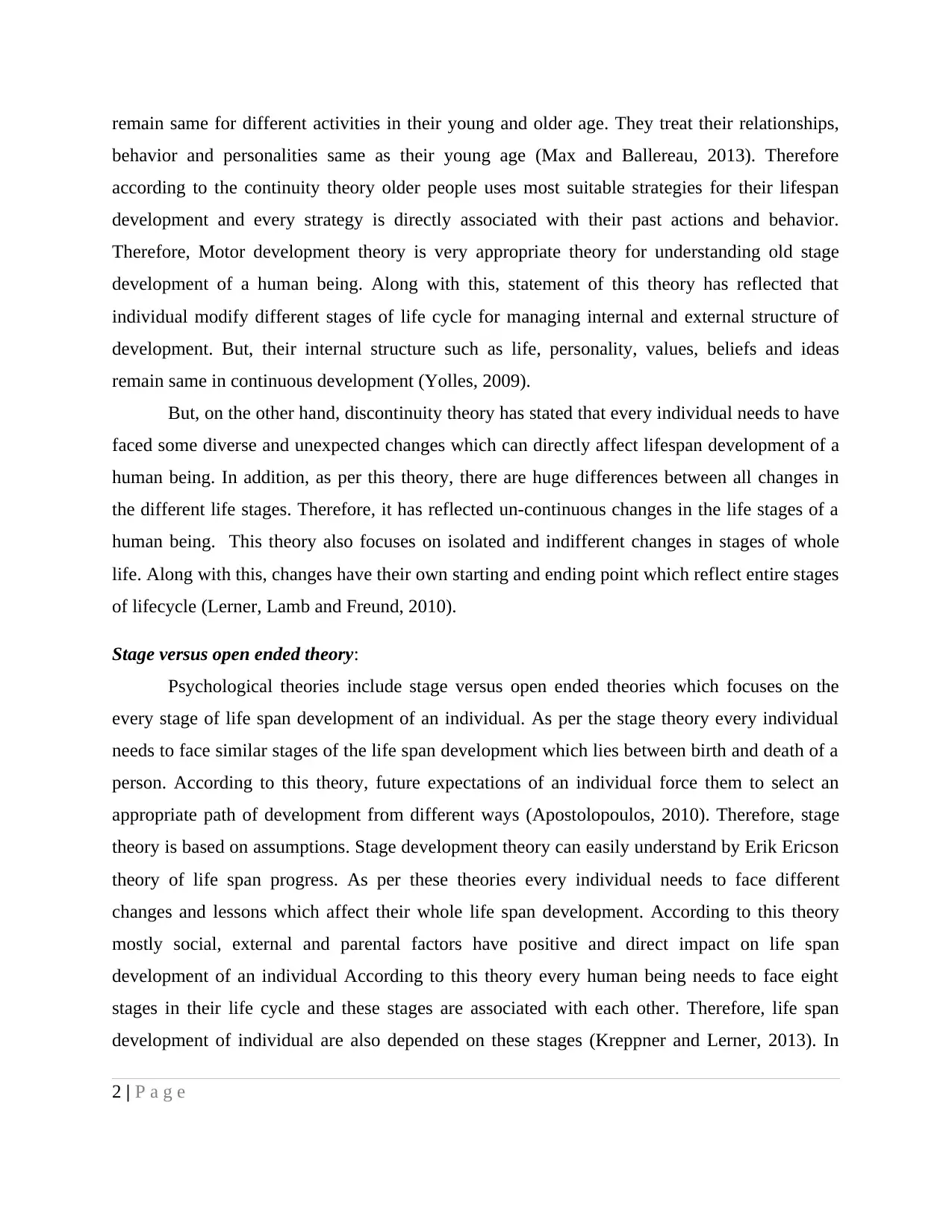
remain same for different activities in their young and older age. They treat their relationships,
behavior and personalities same as their young age (Max and Ballereau, 2013). Therefore
according to the continuity theory older people uses most suitable strategies for their lifespan
development and every strategy is directly associated with their past actions and behavior.
Therefore, Motor development theory is very appropriate theory for understanding old stage
development of a human being. Along with this, statement of this theory has reflected that
individual modify different stages of life cycle for managing internal and external structure of
development. But, their internal structure such as life, personality, values, beliefs and ideas
remain same in continuous development (Yolles, 2009).
But, on the other hand, discontinuity theory has stated that every individual needs to have
faced some diverse and unexpected changes which can directly affect lifespan development of a
human being. In addition, as per this theory, there are huge differences between all changes in
the different life stages. Therefore, it has reflected un-continuous changes in the life stages of a
human being. This theory also focuses on isolated and indifferent changes in stages of whole
life. Along with this, changes have their own starting and ending point which reflect entire stages
of lifecycle (Lerner, Lamb and Freund, 2010).
Stage versus open ended theory:
Psychological theories include stage versus open ended theories which focuses on the
every stage of life span development of an individual. As per the stage theory every individual
needs to face similar stages of the life span development which lies between birth and death of a
person. According to this theory, future expectations of an individual force them to select an
appropriate path of development from different ways (Apostolopoulos, 2010). Therefore, stage
theory is based on assumptions. Stage development theory can easily understand by Erik Ericson
theory of life span progress. As per these theories every individual needs to face different
changes and lessons which affect their whole life span development. According to this theory
mostly social, external and parental factors have positive and direct impact on life span
development of an individual According to this theory every human being needs to face eight
stages in their life cycle and these stages are associated with each other. Therefore, life span
development of individual are also depended on these stages (Kreppner and Lerner, 2013). In
2 | P a g e
behavior and personalities same as their young age (Max and Ballereau, 2013). Therefore
according to the continuity theory older people uses most suitable strategies for their lifespan
development and every strategy is directly associated with their past actions and behavior.
Therefore, Motor development theory is very appropriate theory for understanding old stage
development of a human being. Along with this, statement of this theory has reflected that
individual modify different stages of life cycle for managing internal and external structure of
development. But, their internal structure such as life, personality, values, beliefs and ideas
remain same in continuous development (Yolles, 2009).
But, on the other hand, discontinuity theory has stated that every individual needs to have
faced some diverse and unexpected changes which can directly affect lifespan development of a
human being. In addition, as per this theory, there are huge differences between all changes in
the different life stages. Therefore, it has reflected un-continuous changes in the life stages of a
human being. This theory also focuses on isolated and indifferent changes in stages of whole
life. Along with this, changes have their own starting and ending point which reflect entire stages
of lifecycle (Lerner, Lamb and Freund, 2010).
Stage versus open ended theory:
Psychological theories include stage versus open ended theories which focuses on the
every stage of life span development of an individual. As per the stage theory every individual
needs to face similar stages of the life span development which lies between birth and death of a
person. According to this theory, future expectations of an individual force them to select an
appropriate path of development from different ways (Apostolopoulos, 2010). Therefore, stage
theory is based on assumptions. Stage development theory can easily understand by Erik Ericson
theory of life span progress. As per these theories every individual needs to face different
changes and lessons which affect their whole life span development. According to this theory
mostly social, external and parental factors have positive and direct impact on life span
development of an individual According to this theory every human being needs to face eight
stages in their life cycle and these stages are associated with each other. Therefore, life span
development of individual are also depended on these stages (Kreppner and Lerner, 2013). In
2 | P a g e
Paraphrase This Document
Need a fresh take? Get an instant paraphrase of this document with our AI Paraphraser
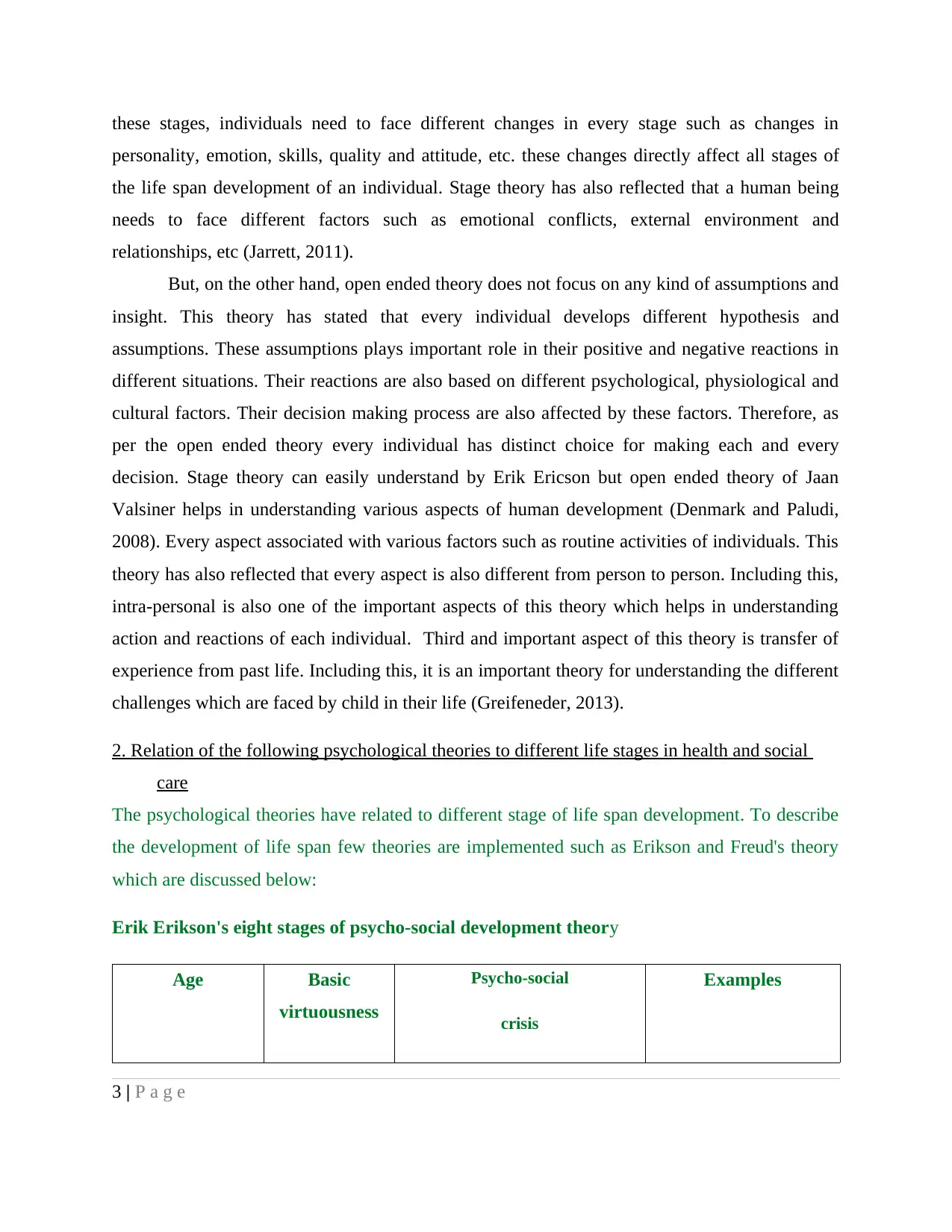
these stages, individuals need to face different changes in every stage such as changes in
personality, emotion, skills, quality and attitude, etc. these changes directly affect all stages of
the life span development of an individual. Stage theory has also reflected that a human being
needs to face different factors such as emotional conflicts, external environment and
relationships, etc (Jarrett, 2011).
But, on the other hand, open ended theory does not focus on any kind of assumptions and
insight. This theory has stated that every individual develops different hypothesis and
assumptions. These assumptions plays important role in their positive and negative reactions in
different situations. Their reactions are also based on different psychological, physiological and
cultural factors. Their decision making process are also affected by these factors. Therefore, as
per the open ended theory every individual has distinct choice for making each and every
decision. Stage theory can easily understand by Erik Ericson but open ended theory of Jaan
Valsiner helps in understanding various aspects of human development (Denmark and Paludi,
2008). Every aspect associated with various factors such as routine activities of individuals. This
theory has also reflected that every aspect is also different from person to person. Including this,
intra-personal is also one of the important aspects of this theory which helps in understanding
action and reactions of each individual. Third and important aspect of this theory is transfer of
experience from past life. Including this, it is an important theory for understanding the different
challenges which are faced by child in their life (Greifeneder, 2013).
2. Relation of the following psychological theories to different life stages in health and social
care
The psychological theories have related to different stage of life span development. To describe
the development of life span few theories are implemented such as Erikson and Freud's theory
which are discussed below:
Erik Erikson's eight stages of psycho-social development theory
Age Basic
virtuousness
Psycho-social
crisis
Examples
3 | P a g e
personality, emotion, skills, quality and attitude, etc. these changes directly affect all stages of
the life span development of an individual. Stage theory has also reflected that a human being
needs to face different factors such as emotional conflicts, external environment and
relationships, etc (Jarrett, 2011).
But, on the other hand, open ended theory does not focus on any kind of assumptions and
insight. This theory has stated that every individual develops different hypothesis and
assumptions. These assumptions plays important role in their positive and negative reactions in
different situations. Their reactions are also based on different psychological, physiological and
cultural factors. Their decision making process are also affected by these factors. Therefore, as
per the open ended theory every individual has distinct choice for making each and every
decision. Stage theory can easily understand by Erik Ericson but open ended theory of Jaan
Valsiner helps in understanding various aspects of human development (Denmark and Paludi,
2008). Every aspect associated with various factors such as routine activities of individuals. This
theory has also reflected that every aspect is also different from person to person. Including this,
intra-personal is also one of the important aspects of this theory which helps in understanding
action and reactions of each individual. Third and important aspect of this theory is transfer of
experience from past life. Including this, it is an important theory for understanding the different
challenges which are faced by child in their life (Greifeneder, 2013).
2. Relation of the following psychological theories to different life stages in health and social
care
The psychological theories have related to different stage of life span development. To describe
the development of life span few theories are implemented such as Erikson and Freud's theory
which are discussed below:
Erik Erikson's eight stages of psycho-social development theory
Age Basic
virtuousness
Psycho-social
crisis
Examples
3 | P a g e
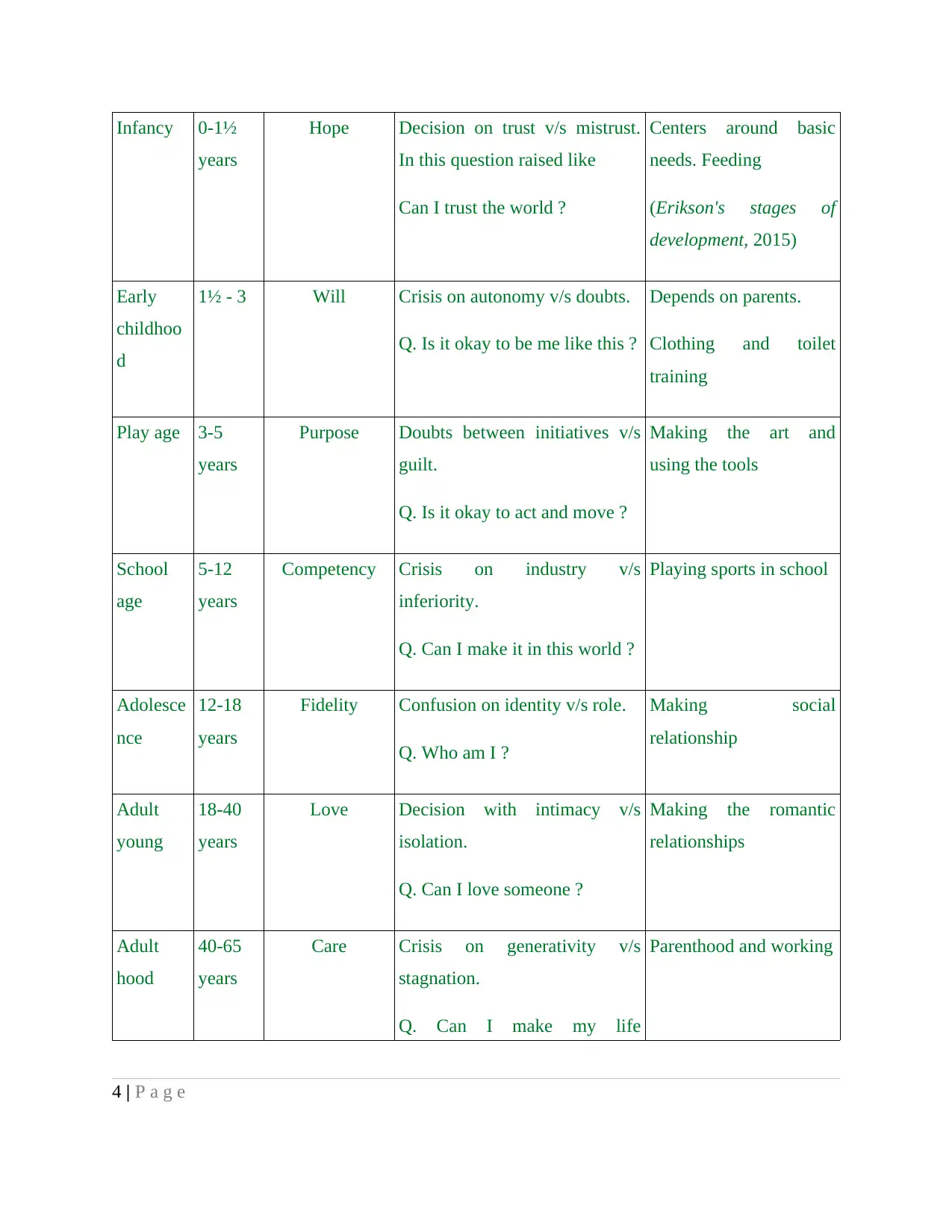
Infancy 0-1½
years
Hope Decision on trust v/s mistrust.
In this question raised like
Can I trust the world ?
Centers around basic
needs. Feeding
(Erikson's stages of
development, 2015)
Early
childhoo
d
1½ - 3 Will Crisis on autonomy v/s doubts.
Q. Is it okay to be me like this ?
Depends on parents.
Clothing and toilet
training
Play age 3-5
years
Purpose Doubts between initiatives v/s
guilt.
Q. Is it okay to act and move ?
Making the art and
using the tools
School
age
5-12
years
Competency Crisis on industry v/s
inferiority.
Q. Can I make it in this world ?
Playing sports in school
Adolesce
nce
12-18
years
Fidelity Confusion on identity v/s role.
Q. Who am I ?
Making social
relationship
Adult
young
18-40
years
Love Decision with intimacy v/s
isolation.
Q. Can I love someone ?
Making the romantic
relationships
Adult
hood
40-65
years
Care Crisis on generativity v/s
stagnation.
Q. Can I make my life
Parenthood and working
4 | P a g e
years
Hope Decision on trust v/s mistrust.
In this question raised like
Can I trust the world ?
Centers around basic
needs. Feeding
(Erikson's stages of
development, 2015)
Early
childhoo
d
1½ - 3 Will Crisis on autonomy v/s doubts.
Q. Is it okay to be me like this ?
Depends on parents.
Clothing and toilet
training
Play age 3-5
years
Purpose Doubts between initiatives v/s
guilt.
Q. Is it okay to act and move ?
Making the art and
using the tools
School
age
5-12
years
Competency Crisis on industry v/s
inferiority.
Q. Can I make it in this world ?
Playing sports in school
Adolesce
nce
12-18
years
Fidelity Confusion on identity v/s role.
Q. Who am I ?
Making social
relationship
Adult
young
18-40
years
Love Decision with intimacy v/s
isolation.
Q. Can I love someone ?
Making the romantic
relationships
Adult
hood
40-65
years
Care Crisis on generativity v/s
stagnation.
Q. Can I make my life
Parenthood and working
4 | P a g e
⊘ This is a preview!⊘
Do you want full access?
Subscribe today to unlock all pages.

Trusted by 1+ million students worldwide
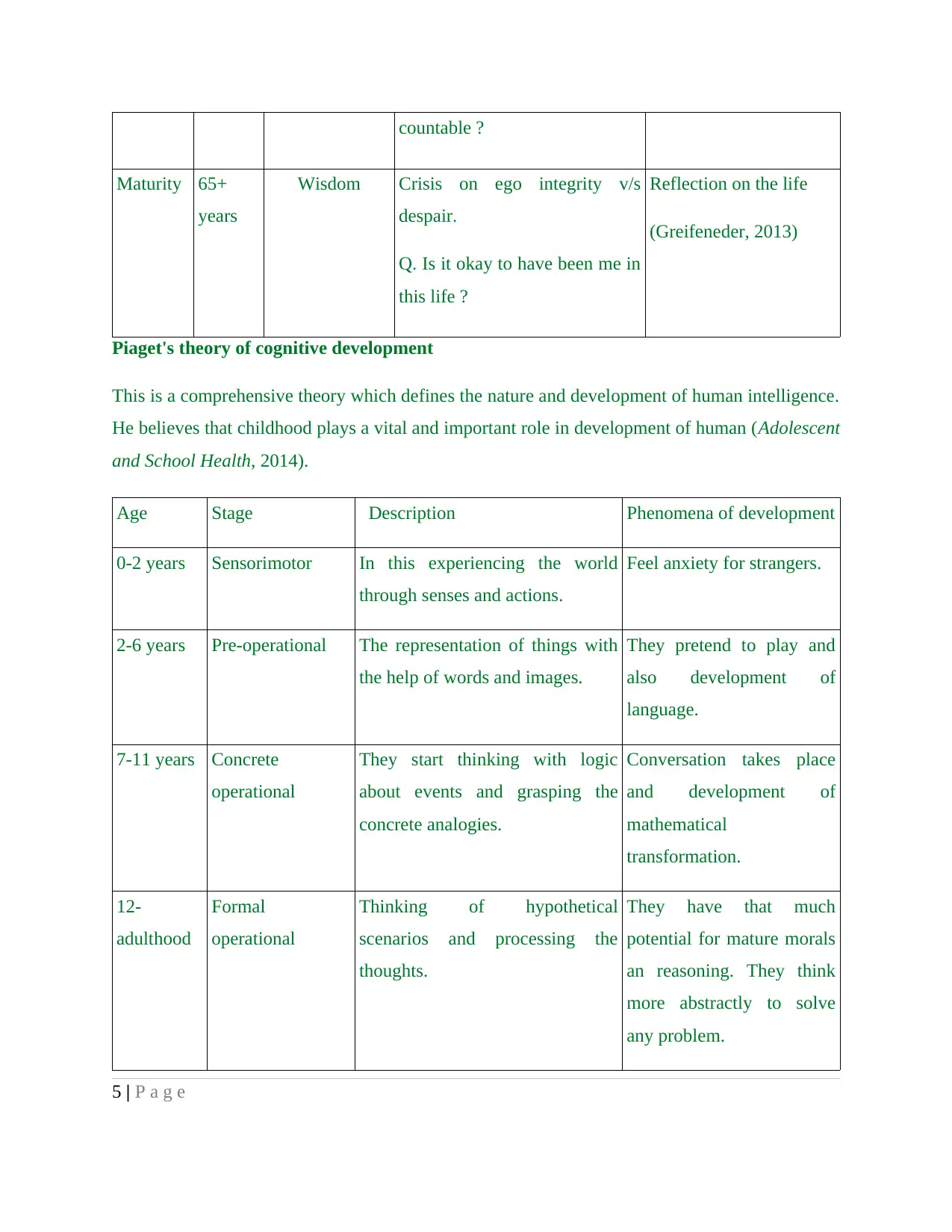
countable ?
Maturity 65+
years
Wisdom Crisis on ego integrity v/s
despair.
Q. Is it okay to have been me in
this life ?
Reflection on the life
(Greifeneder, 2013)
Piaget's theory of cognitive development
This is a comprehensive theory which defines the nature and development of human intelligence.
He believes that childhood plays a vital and important role in development of human (Adolescent
and School Health, 2014).
Age Stage Description Phenomena of development
0-2 years Sensorimotor In this experiencing the world
through senses and actions.
Feel anxiety for strangers.
2-6 years Pre-operational The representation of things with
the help of words and images.
They pretend to play and
also development of
language.
7-11 years Concrete
operational
They start thinking with logic
about events and grasping the
concrete analogies.
Conversation takes place
and development of
mathematical
transformation.
12-
adulthood
Formal
operational
Thinking of hypothetical
scenarios and processing the
thoughts.
They have that much
potential for mature morals
an reasoning. They think
more abstractly to solve
any problem.
5 | P a g e
Maturity 65+
years
Wisdom Crisis on ego integrity v/s
despair.
Q. Is it okay to have been me in
this life ?
Reflection on the life
(Greifeneder, 2013)
Piaget's theory of cognitive development
This is a comprehensive theory which defines the nature and development of human intelligence.
He believes that childhood plays a vital and important role in development of human (Adolescent
and School Health, 2014).
Age Stage Description Phenomena of development
0-2 years Sensorimotor In this experiencing the world
through senses and actions.
Feel anxiety for strangers.
2-6 years Pre-operational The representation of things with
the help of words and images.
They pretend to play and
also development of
language.
7-11 years Concrete
operational
They start thinking with logic
about events and grasping the
concrete analogies.
Conversation takes place
and development of
mathematical
transformation.
12-
adulthood
Formal
operational
Thinking of hypothetical
scenarios and processing the
thoughts.
They have that much
potential for mature morals
an reasoning. They think
more abstractly to solve
any problem.
5 | P a g e
Paraphrase This Document
Need a fresh take? Get an instant paraphrase of this document with our AI Paraphraser
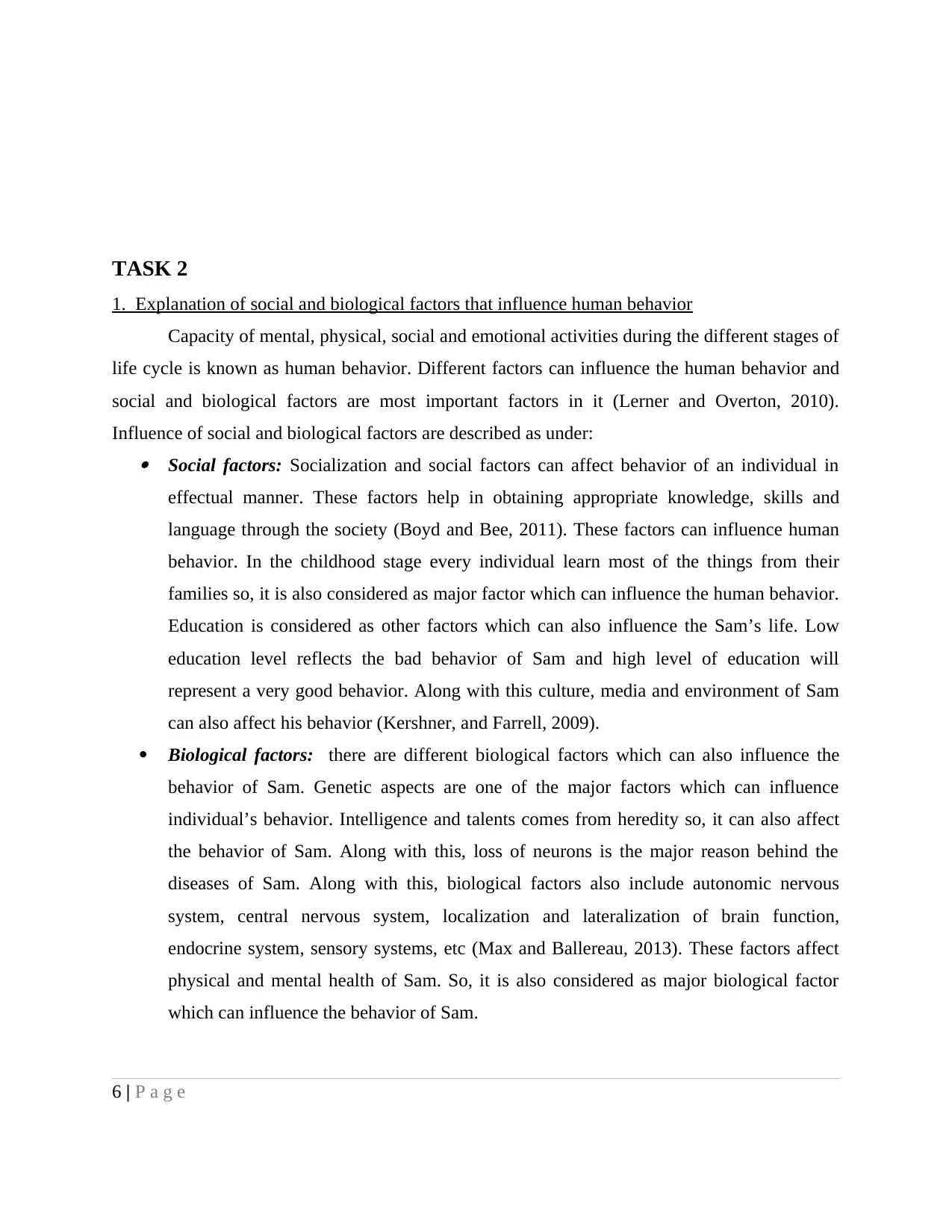
TASK 2
1. Explanation of social and biological factors that influence human behavior
Capacity of mental, physical, social and emotional activities during the different stages of
life cycle is known as human behavior. Different factors can influence the human behavior and
social and biological factors are most important factors in it (Lerner and Overton, 2010).
Influence of social and biological factors are described as under: Social factors: Socialization and social factors can affect behavior of an individual in
effectual manner. These factors help in obtaining appropriate knowledge, skills and
language through the society (Boyd and Bee, 2011). These factors can influence human
behavior. In the childhood stage every individual learn most of the things from their
families so, it is also considered as major factor which can influence the human behavior.
Education is considered as other factors which can also influence the Sam’s life. Low
education level reflects the bad behavior of Sam and high level of education will
represent a very good behavior. Along with this culture, media and environment of Sam
can also affect his behavior (Kershner, and Farrell, 2009).
Biological factors: there are different biological factors which can also influence the
behavior of Sam. Genetic aspects are one of the major factors which can influence
individual’s behavior. Intelligence and talents comes from heredity so, it can also affect
the behavior of Sam. Along with this, loss of neurons is the major reason behind the
diseases of Sam. Along with this, biological factors also include autonomic nervous
system, central nervous system, localization and lateralization of brain function,
endocrine system, sensory systems, etc (Max and Ballereau, 2013). These factors affect
physical and mental health of Sam. So, it is also considered as major biological factor
which can influence the behavior of Sam.
6 | P a g e
1. Explanation of social and biological factors that influence human behavior
Capacity of mental, physical, social and emotional activities during the different stages of
life cycle is known as human behavior. Different factors can influence the human behavior and
social and biological factors are most important factors in it (Lerner and Overton, 2010).
Influence of social and biological factors are described as under: Social factors: Socialization and social factors can affect behavior of an individual in
effectual manner. These factors help in obtaining appropriate knowledge, skills and
language through the society (Boyd and Bee, 2011). These factors can influence human
behavior. In the childhood stage every individual learn most of the things from their
families so, it is also considered as major factor which can influence the human behavior.
Education is considered as other factors which can also influence the Sam’s life. Low
education level reflects the bad behavior of Sam and high level of education will
represent a very good behavior. Along with this culture, media and environment of Sam
can also affect his behavior (Kershner, and Farrell, 2009).
Biological factors: there are different biological factors which can also influence the
behavior of Sam. Genetic aspects are one of the major factors which can influence
individual’s behavior. Intelligence and talents comes from heredity so, it can also affect
the behavior of Sam. Along with this, loss of neurons is the major reason behind the
diseases of Sam. Along with this, biological factors also include autonomic nervous
system, central nervous system, localization and lateralization of brain function,
endocrine system, sensory systems, etc (Max and Ballereau, 2013). These factors affect
physical and mental health of Sam. So, it is also considered as major biological factor
which can influence the behavior of Sam.
6 | P a g e
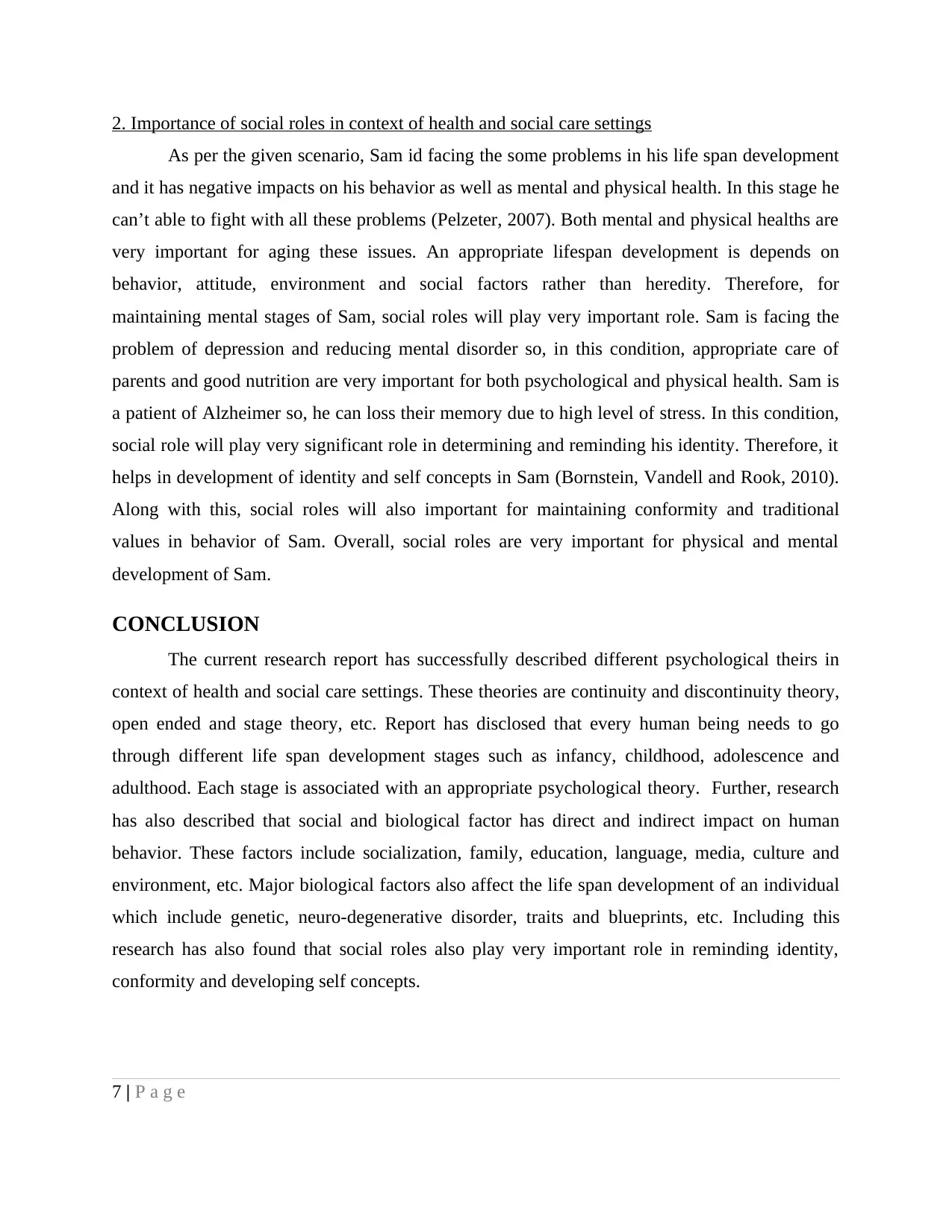
2. Importance of social roles in context of health and social care settings
As per the given scenario, Sam id facing the some problems in his life span development
and it has negative impacts on his behavior as well as mental and physical health. In this stage he
can’t able to fight with all these problems (Pelzeter, 2007). Both mental and physical healths are
very important for aging these issues. An appropriate lifespan development is depends on
behavior, attitude, environment and social factors rather than heredity. Therefore, for
maintaining mental stages of Sam, social roles will play very important role. Sam is facing the
problem of depression and reducing mental disorder so, in this condition, appropriate care of
parents and good nutrition are very important for both psychological and physical health. Sam is
a patient of Alzheimer so, he can loss their memory due to high level of stress. In this condition,
social role will play very significant role in determining and reminding his identity. Therefore, it
helps in development of identity and self concepts in Sam (Bornstein, Vandell and Rook, 2010).
Along with this, social roles will also important for maintaining conformity and traditional
values in behavior of Sam. Overall, social roles are very important for physical and mental
development of Sam.
CONCLUSION
The current research report has successfully described different psychological theirs in
context of health and social care settings. These theories are continuity and discontinuity theory,
open ended and stage theory, etc. Report has disclosed that every human being needs to go
through different life span development stages such as infancy, childhood, adolescence and
adulthood. Each stage is associated with an appropriate psychological theory. Further, research
has also described that social and biological factor has direct and indirect impact on human
behavior. These factors include socialization, family, education, language, media, culture and
environment, etc. Major biological factors also affect the life span development of an individual
which include genetic, neuro-degenerative disorder, traits and blueprints, etc. Including this
research has also found that social roles also play very important role in reminding identity,
conformity and developing self concepts.
7 | P a g e
As per the given scenario, Sam id facing the some problems in his life span development
and it has negative impacts on his behavior as well as mental and physical health. In this stage he
can’t able to fight with all these problems (Pelzeter, 2007). Both mental and physical healths are
very important for aging these issues. An appropriate lifespan development is depends on
behavior, attitude, environment and social factors rather than heredity. Therefore, for
maintaining mental stages of Sam, social roles will play very important role. Sam is facing the
problem of depression and reducing mental disorder so, in this condition, appropriate care of
parents and good nutrition are very important for both psychological and physical health. Sam is
a patient of Alzheimer so, he can loss their memory due to high level of stress. In this condition,
social role will play very significant role in determining and reminding his identity. Therefore, it
helps in development of identity and self concepts in Sam (Bornstein, Vandell and Rook, 2010).
Along with this, social roles will also important for maintaining conformity and traditional
values in behavior of Sam. Overall, social roles are very important for physical and mental
development of Sam.
CONCLUSION
The current research report has successfully described different psychological theirs in
context of health and social care settings. These theories are continuity and discontinuity theory,
open ended and stage theory, etc. Report has disclosed that every human being needs to go
through different life span development stages such as infancy, childhood, adolescence and
adulthood. Each stage is associated with an appropriate psychological theory. Further, research
has also described that social and biological factor has direct and indirect impact on human
behavior. These factors include socialization, family, education, language, media, culture and
environment, etc. Major biological factors also affect the life span development of an individual
which include genetic, neuro-degenerative disorder, traits and blueprints, etc. Including this
research has also found that social roles also play very important role in reminding identity,
conformity and developing self concepts.
7 | P a g e
⊘ This is a preview!⊘
Do you want full access?
Subscribe today to unlock all pages.

Trusted by 1+ million students worldwide
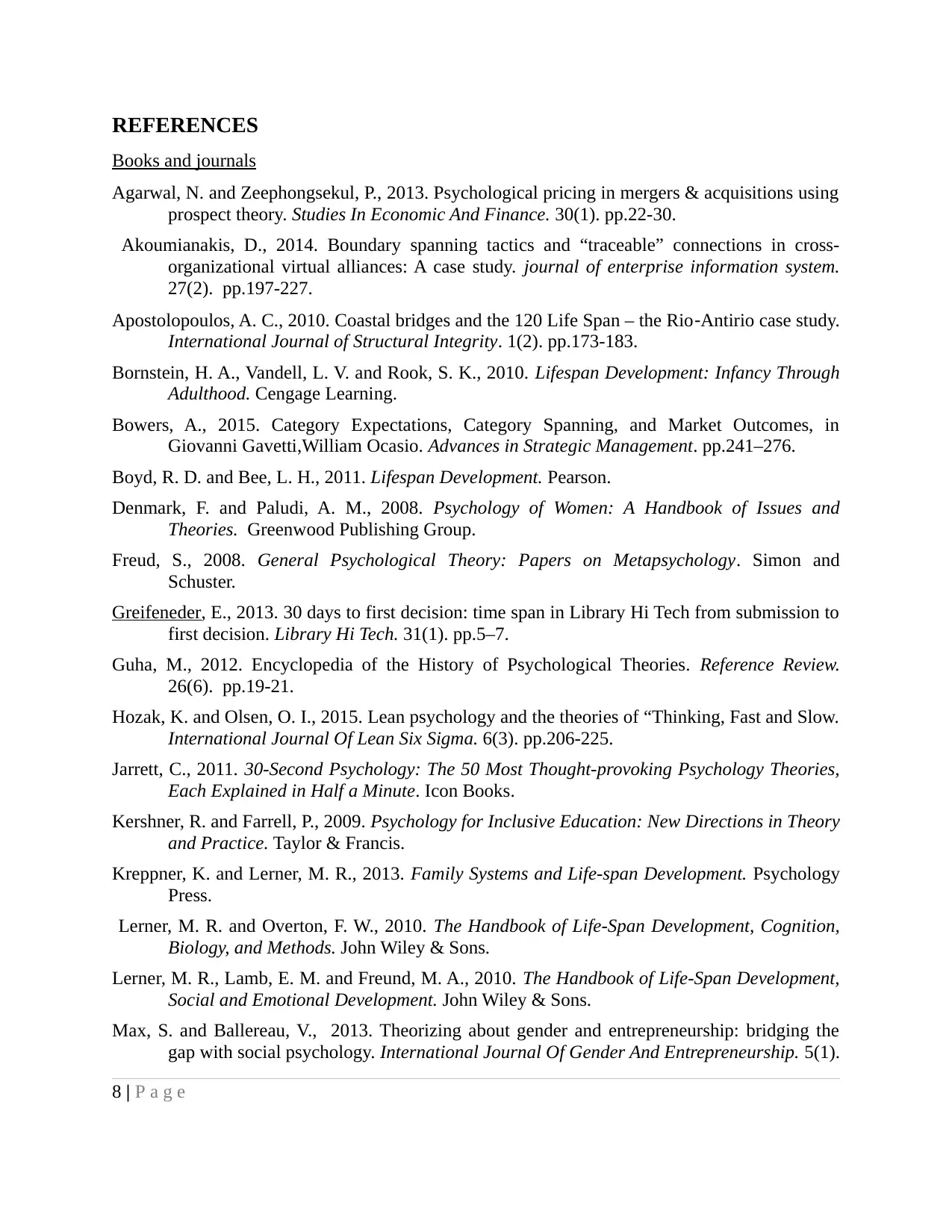
REFERENCES
Books and journals
Agarwal, N. and Zeephongsekul, P., 2013. Psychological pricing in mergers & acquisitions using
prospect theory. Studies In Economic And Finance. 30(1). pp.22-30.
Akoumianakis, D., 2014. Boundary spanning tactics and “traceable” connections in cross-
organizational virtual alliances: A case study. journal of enterprise information system.
27(2). pp.197-227.
Apostolopoulos, A. C., 2010. Coastal bridges and the 120 Life Span – the Rio‐Antirio case study.
International Journal of Structural Integrity. 1(2). pp.173-183.
Bornstein, H. A., Vandell, L. V. and Rook, S. K., 2010. Lifespan Development: Infancy Through
Adulthood. Cengage Learning.
Bowers, A., 2015. Category Expectations, Category Spanning, and Market Outcomes, in
Giovanni Gavetti,William Ocasio. Advances in Strategic Management. pp.241–276.
Boyd, R. D. and Bee, L. H., 2011. Lifespan Development. Pearson.
Denmark, F. and Paludi, A. M., 2008. Psychology of Women: A Handbook of Issues and
Theories. Greenwood Publishing Group.
Freud, S., 2008. General Psychological Theory: Papers on Metapsychology. Simon and
Schuster.
Greifeneder, E., 2013. 30 days to first decision: time span in Library Hi Tech from submission to
first decision. Library Hi Tech. 31(1). pp.5–7.
Guha, M., 2012. Encyclopedia of the History of Psychological Theories. Reference Review.
26(6). pp.19-21.
Hozak, K. and Olsen, O. I., 2015. Lean psychology and the theories of “Thinking, Fast and Slow.
International Journal Of Lean Six Sigma. 6(3). pp.206-225.
Jarrett, C., 2011. 30-Second Psychology: The 50 Most Thought-provoking Psychology Theories,
Each Explained in Half a Minute. Icon Books.
Kershner, R. and Farrell, P., 2009. Psychology for Inclusive Education: New Directions in Theory
and Practice. Taylor & Francis.
Kreppner, K. and Lerner, M. R., 2013. Family Systems and Life-span Development. Psychology
Press.
Lerner, M. R. and Overton, F. W., 2010. The Handbook of Life-Span Development, Cognition,
Biology, and Methods. John Wiley & Sons.
Lerner, M. R., Lamb, E. M. and Freund, M. A., 2010. The Handbook of Life-Span Development,
Social and Emotional Development. John Wiley & Sons.
Max, S. and Ballereau, V., 2013. Theorizing about gender and entrepreneurship: bridging the
gap with social psychology. International Journal Of Gender And Entrepreneurship. 5(1).
8 | P a g e
Books and journals
Agarwal, N. and Zeephongsekul, P., 2013. Psychological pricing in mergers & acquisitions using
prospect theory. Studies In Economic And Finance. 30(1). pp.22-30.
Akoumianakis, D., 2014. Boundary spanning tactics and “traceable” connections in cross-
organizational virtual alliances: A case study. journal of enterprise information system.
27(2). pp.197-227.
Apostolopoulos, A. C., 2010. Coastal bridges and the 120 Life Span – the Rio‐Antirio case study.
International Journal of Structural Integrity. 1(2). pp.173-183.
Bornstein, H. A., Vandell, L. V. and Rook, S. K., 2010. Lifespan Development: Infancy Through
Adulthood. Cengage Learning.
Bowers, A., 2015. Category Expectations, Category Spanning, and Market Outcomes, in
Giovanni Gavetti,William Ocasio. Advances in Strategic Management. pp.241–276.
Boyd, R. D. and Bee, L. H., 2011. Lifespan Development. Pearson.
Denmark, F. and Paludi, A. M., 2008. Psychology of Women: A Handbook of Issues and
Theories. Greenwood Publishing Group.
Freud, S., 2008. General Psychological Theory: Papers on Metapsychology. Simon and
Schuster.
Greifeneder, E., 2013. 30 days to first decision: time span in Library Hi Tech from submission to
first decision. Library Hi Tech. 31(1). pp.5–7.
Guha, M., 2012. Encyclopedia of the History of Psychological Theories. Reference Review.
26(6). pp.19-21.
Hozak, K. and Olsen, O. I., 2015. Lean psychology and the theories of “Thinking, Fast and Slow.
International Journal Of Lean Six Sigma. 6(3). pp.206-225.
Jarrett, C., 2011. 30-Second Psychology: The 50 Most Thought-provoking Psychology Theories,
Each Explained in Half a Minute. Icon Books.
Kershner, R. and Farrell, P., 2009. Psychology for Inclusive Education: New Directions in Theory
and Practice. Taylor & Francis.
Kreppner, K. and Lerner, M. R., 2013. Family Systems and Life-span Development. Psychology
Press.
Lerner, M. R. and Overton, F. W., 2010. The Handbook of Life-Span Development, Cognition,
Biology, and Methods. John Wiley & Sons.
Lerner, M. R., Lamb, E. M. and Freund, M. A., 2010. The Handbook of Life-Span Development,
Social and Emotional Development. John Wiley & Sons.
Max, S. and Ballereau, V., 2013. Theorizing about gender and entrepreneurship: bridging the
gap with social psychology. International Journal Of Gender And Entrepreneurship. 5(1).
8 | P a g e
Paraphrase This Document
Need a fresh take? Get an instant paraphrase of this document with our AI Paraphraser
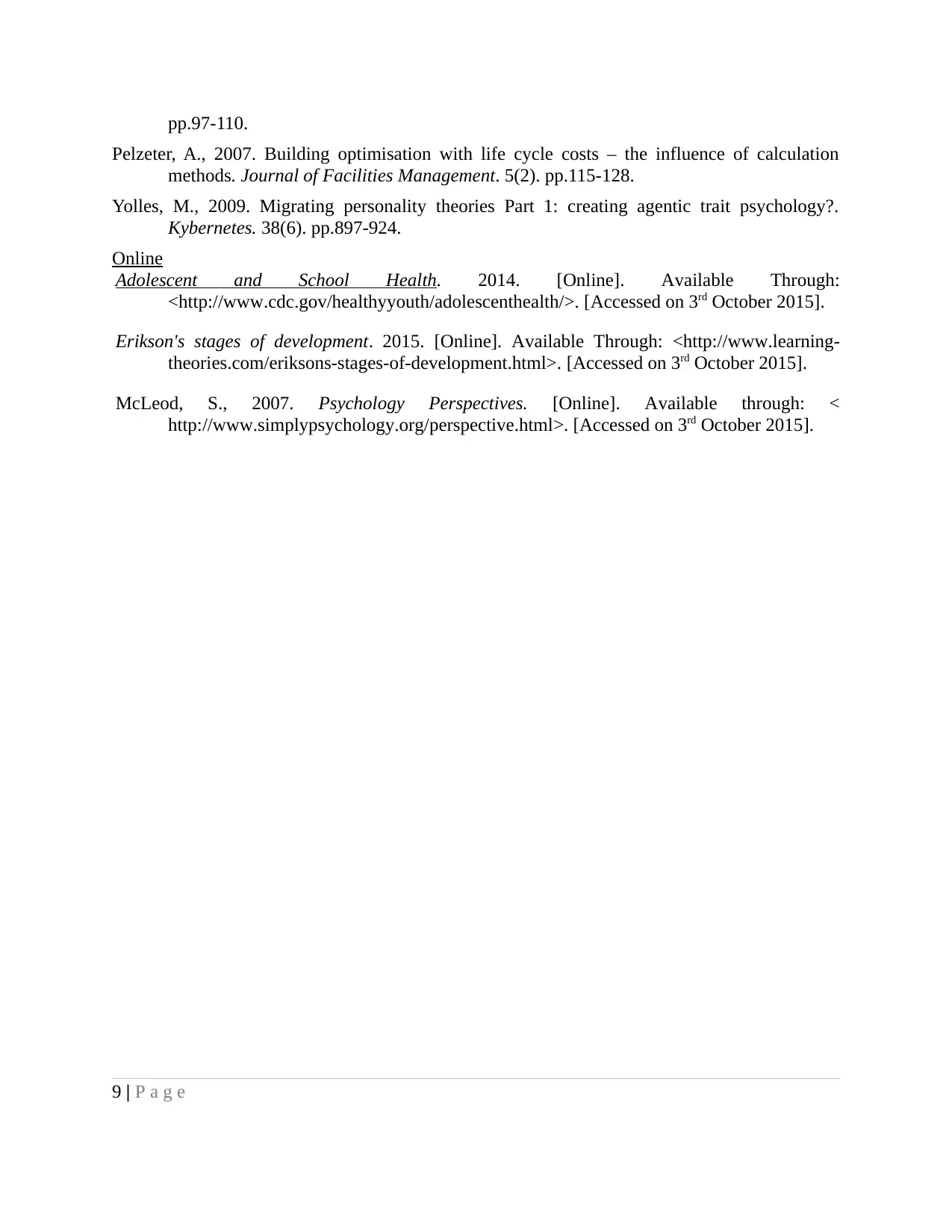
pp.97-110.
Pelzeter, A., 2007. Building optimisation with life cycle costs – the influence of calculation
methods. Journal of Facilities Management. 5(2). pp.115-128.
Yolles, M., 2009. Migrating personality theories Part 1: creating agentic trait psychology?.
Kybernetes. 38(6). pp.897-924.
Online
Adolescent and School Health. 2014. [Online]. Available Through:
<http://www.cdc.gov/healthyyouth/adolescenthealth/>. [Accessed on 3rd October 2015].
Erikson's stages of development. 2015. [Online]. Available Through: <http://www.learning-
theories.com/eriksons-stages-of-development.html>. [Accessed on 3rd October 2015].
McLeod, S., 2007. Psychology Perspectives. [Online]. Available through: <
http://www.simplypsychology.org/perspective.html>. [Accessed on 3rd October 2015].
9 | P a g e
Pelzeter, A., 2007. Building optimisation with life cycle costs – the influence of calculation
methods. Journal of Facilities Management. 5(2). pp.115-128.
Yolles, M., 2009. Migrating personality theories Part 1: creating agentic trait psychology?.
Kybernetes. 38(6). pp.897-924.
Online
Adolescent and School Health. 2014. [Online]. Available Through:
<http://www.cdc.gov/healthyyouth/adolescenthealth/>. [Accessed on 3rd October 2015].
Erikson's stages of development. 2015. [Online]. Available Through: <http://www.learning-
theories.com/eriksons-stages-of-development.html>. [Accessed on 3rd October 2015].
McLeod, S., 2007. Psychology Perspectives. [Online]. Available through: <
http://www.simplypsychology.org/perspective.html>. [Accessed on 3rd October 2015].
9 | P a g e

Online
10 | P a g e
10 | P a g e
⊘ This is a preview!⊘
Do you want full access?
Subscribe today to unlock all pages.

Trusted by 1+ million students worldwide
1 out of 12
Related Documents
Your All-in-One AI-Powered Toolkit for Academic Success.
+13062052269
info@desklib.com
Available 24*7 on WhatsApp / Email
![[object Object]](/_next/static/media/star-bottom.7253800d.svg)
Unlock your academic potential
Copyright © 2020–2026 A2Z Services. All Rights Reserved. Developed and managed by ZUCOL.




